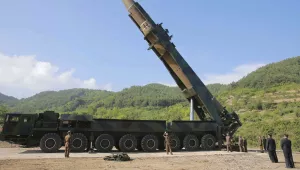The last several days have seen the once dormant debate—whether or not the U.S. should start supplying weapons to Ukraine—reignite. The debate was revived by the release of a joint report by a group of ex-U.S. officials affiliated with three prominent American think tanks, which recommended that Washington urgently supply anti-tank missiles, counter-battery radars, and other military hardware to the Ukrainian armed forces so that the latter can deter Russia from escalating the conflict in Donbass.
I don’t dispute that the Ukrainian army would become stronger if the U.S. delivers the recommended weapons. But the truth is these weapons would not end the conflict. Moreover, these deliveries may actually prompt Russia to increase its involvement in the conflict, dragging the U.S. into a vicious cycle of escalating commitments. Chances that the U.S. would prevail in such an escalation are quite low. Whatever U.S. authorities would be realistically willing to do to help Ukraine militarily can be matched, if not exceeded, by Russia, which is much more interested in the outcome of the current stand-off and has resources on the ground. In addition to escalating in Ukraine, Russia could also respond to the U.S. arming of Ukraine by adopting a more aggressive posture vis-à-vis the U.S. in the realm of strategic nuclear deterrence, as well as acting as a spoiler to undermine U.S. vital interests in such spheres as countering proliferation of nuclear weapons and managing China’s rise. Even some of Putin’s critics in Western Europe admit that the consequences of arming Ukraine will not be limited to the conflict there. “It could lead to a nuclear war,” Polish statesman Lech Walesa said last year when asked whether the Europeans should send weapons to Ukrainians.
The report now argues that a better-armed Ukrainian army would be able to inflict greater casualties on Russian “volunteers” in Ukraine and that, therefore, prospects of such casualties should help to deter Russia. Not really. Yes, Vladimir Putin will remain sensitive to casualties among active-duty Russian personnel in the conflict, but only as long as he maintains that Russia is not a party to the conflict. The delivery of U.S. arms could eventually give Putin a pretext to send troops to Ukraine openly in order to accomplish what the Kremlin would describe as a just cause of protecting ethnic Russian compatriots from the Ukrainian army that the Russian president has already described as a “NATO legion.”
Once (and if) the Russian army gets officially involved in the conflict, the Russian population might actually become more tolerant toward casualties, and so will Putin. The experience of the second Chechen war shows that while the Russian public’s tolerance for casualties is not limitless, it can be quite high as long the Russians believe their army is fighting to defend the country’s interests and stands a fair chance of prevailing in the conflict. That the Russian army will be able to win the military phase of the conflict in Ukraine with relative ease is clear from Ukrainian commanders’ own confessions that they took a beating when Russian regular forces allegedly joined the fighting last summer. Ukraine will be destroyed militarily if the West supplies weapons to Kiev, according to an article penned by a member of Russia’s Security Council’s Advisory Board for the next issue of the Russia in Global Affairs journal. The secretary of that council, Nikolai Patrushev, warned on February 10 that supplies of U.S. arms to Ukraine would make the United States a “direct participant” in the conflict and lead to “further escalation” even though he insisted Russia would respond to such supplies through “diplomatic methods” only.
I should also note that the U.S. government has already supplied counter-battery radars that the report recommends sending to Ukrainian armed forces, but that those supplies didn’t lead to significant changes on the ground. It is also unclear to me why a country which designs and manufactures an entire line of armored vehicles, including APCs and MBTs, would need Humvees, which do not really offer much protection from artillery or tank guns. Among ex-Soviet republics, Ukraine’s defense industry is second only to Russia’s, producing not only tanks, but also missiles and planes. Post-Soviet Ukraine also has had such a surplus of arms that it has been selling them actively to Georgia and other countries, netting more than $1 billion a year from exports of both used and new weaponry. If the U.S. really wanted to significantly alter the Russian-Ukrainian military balance, it would have to supply game-changing systems rather than the kinds of weapons that the report recommends supplying in short-term. But we all know Washington is not going to deliver the most advanced of its weaponry systems, and even if it did, it would take a long time to train Ukrainians to operate those, giving Russia time to carry out a preemptive strike. Those advocating supplies of advanced U.S. arms to Kiev should ask themselves: delivery of what kinds of arms can prompt Russia to carry out a preemptive strike and what would be U.S. options for responding to such a strike?
What Ukraine needs more than any weapons is greater quantities of professionally trained soldiers. Helping Ukraine to train and maintain a larger professional army would accomplish much more in enhancing its deterrence and combat capabilities than supplies of UAVs or Humvees ever would. Only after such a professional army is formed can one think start thinking about arming them with state-of-the-art weapons and systems, the mastering of which would require a high level of basic knowledge that conscripts lack. But again, Ukraine cannot afford such an army and I have very strong doubts that the U.S. government will be willing to spend the billions of dollars that would be needed to train, arm and maintain a force that would be armed and numerous enough to fight Russian armed forces to a standstill. Such core members of NATO as Germany and France have already stated they have no plans to participate in arming Ukraine.
When weighing whether to accept the report’s recommendations, U.S. policymakers should not lose sight of the bigger picture. And the bigger picture is that integration of Ukraine, which is located thousands of miles away from the U.S. and which 84% Americans cannot locate on the map, into the Western economic and military architectures doesn’t represent a U.S. vital interest. America has somehow survived without a Western-integrated Ukraine, and it can easily continue to prosper without becoming a de-facto military-technical ally of Ukraine, which is what the U.S. would become if all of the report’s recommendations are fulfilled. In comparison, even if we were to acknowledge that Ukraine occupies a special place in Russian history, it is in contemporary Russia’s vital interest to ensure that that its Slav neighbor is at least neutral, if not friendly, to Russia.
It is, of course, a vital U.S. interest to prevent proliferation of nuclear weapons. And yes, the conflict in Ukraine has done serious damage to the non-proliferation regime, given that Russia has violated its Budapest Memorandum obligation. But that damage has already been done and should be treated as what economists describe as “sunken costs.” It is as important for the U.S. to ensure the alliance’s ability to defend itself. But deterring Russia from challenging NATO’s Article V obligation, covertly or overtly, requires strengthening the alliance itself rather than arming a neighbor that is bound to lose, no matter how many arms it gets, if Russia decides to stage an open military intervention.
Rather than arm Ukraine, the U.S. and its allies should help this country to first overcome its current financial woes and then pursue structural reforms that would strengthen the Ukrainian economy and statehood, including steps to reduce energy waste, increase labor productivity, crack down on persuasive corruption, tame the powerful oligarchs, and improve quality of public administration in general. An economically strong, stable Ukraine would be far less vulnerable to external pressure.
Ukraine should also be encouraged to codify military-political neutrality and decentralization in its constitution. Shortly before the latest escalation in fighting in Ukraine, Russian Foreign Minister Sergei Lavrov had openly identified lack of constitutional reforms in Ukraine as the key sticking point in the negotiations over the conflict. Of course, Ukraine has the right to be outraged by external support for separatism on its territory. But the reality is that taking higher moral ground doesn’t allow one to hold one’s ground literally. With or without U.S. arms, Ukraine cannot end Russia’s support for separatists, which Moscow frames as support for compatriots, unless it grants some of the wishes that Moscow formulated back in March 2014.
Russia, for its part, should fulfill its part of the Minsk agreement, which provided for OSCE monitoring of the Russian-Ukrainian border and creation of a security zone there, among other things.
Neither of the parties to this horrendous conflict, which has already claimed more than 5,200 lives, can claim full innocence. Both sides should work toward a compromise to end the violence and to help transform Ukraine into a neutral, stable state capable of sustaining itself economically and at peace with itself and its neighbors.
Saradzhyan, Simon. “Weapons Won't End the Conflict.” Perspectives on Peace and Security, February 2015



